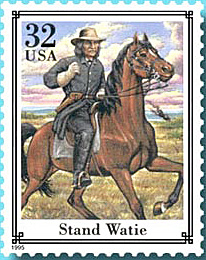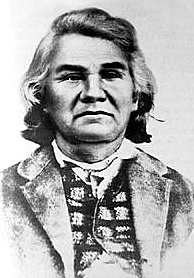
Stand Watie (1806-1871)
Born on the Cherokee Nation in Georgia to a prominent family of anti-abolitionist landowners who supported relocating west to avoid further conflict with whites, Stand Watie (his Cherokee name, De-ga-ta-ga, translates as "he stands") became involved in two conflicts at once: with Union-supporting Cherokees in Indian Territory (Oklahoma), and with the United States government. In 1861 he was commissioned as a colonel in the Confederate army, and his men were organized as the Cherokee Regiment of Mounted Rifles. Watie’s band took part in eighteen battles and skirmishes with Union troops during the Civil War. A fight at Oak Hills in August 1861 helped assure the Confederacy’s hold on Indian Territory, and Watie led his men to pursue and harass federal troops and supply trains in Kansas as well as Arkansas. In 1864 he and his men captured a federal steamboat on the Arkansas River that carried $150,000 worth of cargo. In the same year, during second Battle of Cabin Creek, Watie captured a federal wagon train that was estimated worth $1.5 million. Afterward, he was given command of the First Indian Brigade and promoted to brigadier general, the only American Indian to have earned such a rank during the war. After the war Watie returned to his home at Honey Creek in Indian Territory. He died in poverty in 1871.

